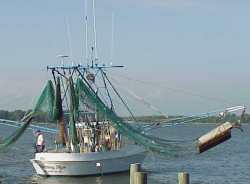|
Resolution in favour of prohibiting fishing in waters below 1000 metres
 In late February, the main intergovernmental decision-making body on fishing in the Mediterranean, the General Fisheries Commission for the Mediterranean (GFCM), resolved to call a halt to fishing activities in deep waters below 1000 metres on the basis of scientific considerations. This strong measure was the result of a comprehensive study on the state of deep water fishing in the Mediterranean carried out by the IUCN and the WWF. The study had been discussed in extensive consultation with regional specialists, including the Mediterranean Science Commission (CIESM, acronym in French) at several workshops held over previous months. The resolution came into force in September 2005. Members of the GFCM are: Albania, Algeria, Bulgaria, Croatia, Cyprus, Egypt, Slovenia, Spain, France, Greece, Israel, Italy, Japan, Lebanon, Libya, Malta, Monaco, Romania, Serbia and Montenegro, Syria, Tunisia and Turkey. In late February, the main intergovernmental decision-making body on fishing in the Mediterranean, the General Fisheries Commission for the Mediterranean (GFCM), resolved to call a halt to fishing activities in deep waters below 1000 metres on the basis of scientific considerations. This strong measure was the result of a comprehensive study on the state of deep water fishing in the Mediterranean carried out by the IUCN and the WWF. The study had been discussed in extensive consultation with regional specialists, including the Mediterranean Science Commission (CIESM, acronym in French) at several workshops held over previous months. The resolution came into force in September 2005. Members of the GFCM are: Albania, Algeria, Bulgaria, Croatia, Cyprus, Egypt, Slovenia, Spain, France, Greece, Israel, Italy, Japan, Lebanon, Libya, Malta, Monaco, Romania, Serbia and Montenegro, Syria, Tunisia and Turkey.
This resolution is being seen as a unique example in the world of conservation of the deep-sea. IUCN-Med presented the resolution along with other activities relating to the management of Mediterranean marine protected areas at the 1st International Marine Protected Areas Congress, held in Australia in October 2005. In additional, during the biennial meeting promoted by the Fondation Total pour la Biodiversité et la Mer held at Porquerolles (October 2005), IUCN-Med organised a workshop on the problems of the Mediterranean deep-sea.
|